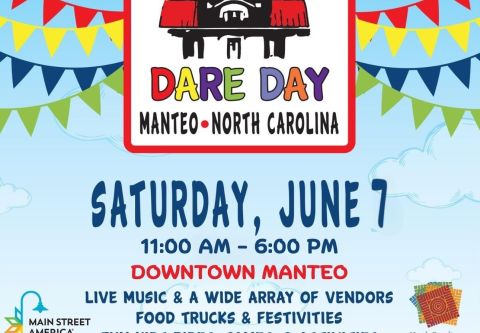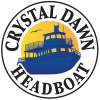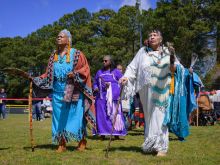
Well before European explorers arrived in the coastal region we now call the Outer Banks, this area was home to Roanoke-Hatteras Indians, part of the Algonquian Nation, which stretched from Canada to Florida.
While the legacy of the early English colonies and the lost colony has endured on the Outer Banks, sadly, the legacy of the natives of this land – their lives before and after the colonists arrived – is treated like a footnote in history. Most people have no idea that descendants of the Roanoke-Hatteras Indians are still living in the area today.
The Roanoke Island American Indian Powwow and Festival, coming up on April 26 and 27 in Manteo, is a reminder that local American Indian culture and history is alive and well. Sponsored by the Algonquian Indians of North Carolina, Inc. and the Roanoke-Hatteras Indians of Dare County, it’s a chance for people to recognize the American Indian history of the Outer Banks and to experience and celebrate the culture and traditions of the Algonquian tribes on the North Carolina coast.
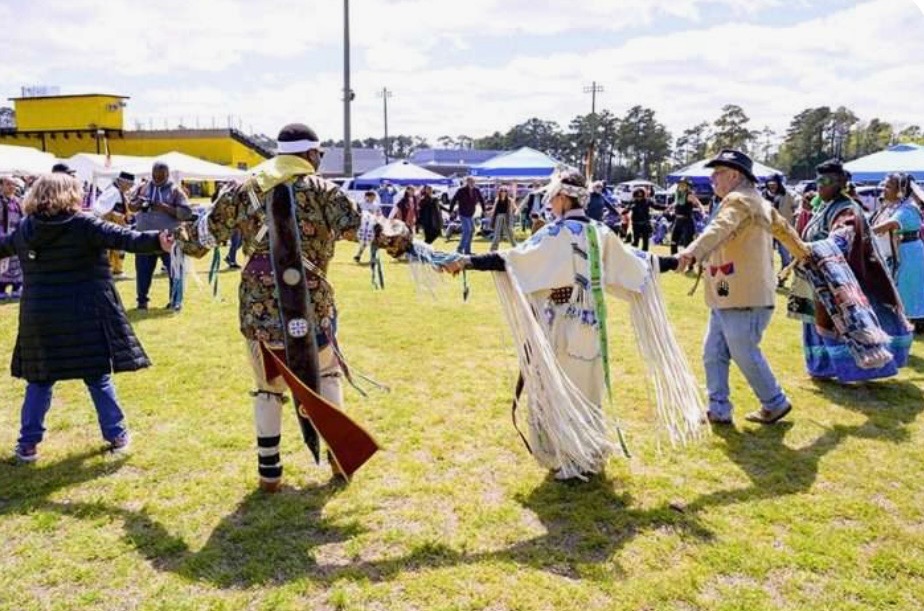
It is also an opportunity for modern-day members of the Roanoke-Hatteras tribe to proudly and publicly claim their American Indian ancestral ties.
Part of the reason that people do not know about the modern-day presence of the Roanoke-Hatteras Indians is that for hundreds of years, and even to this day, people who know their American Indian lineage have been warned to keep it a family secret. Because of the many cruel ways indigenous people have been treated in America, some families have been fearful of exposing their heritage.
Marilyn Berry Morrison, chief of the Roanoke-Hatteras Tribe of the Algonquian Indians of North Carolina, was one of the children who was not encouraged to talk about her heritage when she was growing up.
“I was always told not to talk about it,” she says. “But I’m a curious person and I always asked, ‘Why? Why can’t we talk about it?’”
Morrison, whose great-grandparents, grandparents and parents were born on Roanoke Island, started to search for answers, and then others started to search for answers too. Through genealogy, extensive research and family oral histories, they pieced together the lineage of the Roanoke-Hatteras Indians.
Because Roanoke-Hatteras is not recognized as a tribe by the State of North Carolina’s Commission on Indian Affairs, Morrison and others had to set about proving its existence to the state.
Morrison and her sister, Gemaine Berry Gillis, both certified genealogists, and others have been trying for 23 years to get official state recognition.
“We know who we are and we have documentation to prove it,” Morrison says. “We have been able to find the presence of our tribe dating back to 1733.”
Morrison cites the Bowen Map and the Mosley Map, which show the Roanoke-Hatteras as one of the historic North Carolina tribes, along with the Mattamuskeet, Meherrin, Cherokee, Occaneechi and Tuscarora. There are eight state-recognized tribes in North Carolina, but the state does not recognize the Roanoke-Hatteras, Mattamuskeet and Tuscarora tribes.
The Roanoke-Hatteras and Tuscarora have petitioned the state for recognition, and Morrison is hopeful that it will come soon for the Roanoke-Hatteras.
“We have given all the documentation they needed and resolved concerns and are hoping they will accept that,” she says. “I just want to preserve our history and make sure it’s told correctly.”
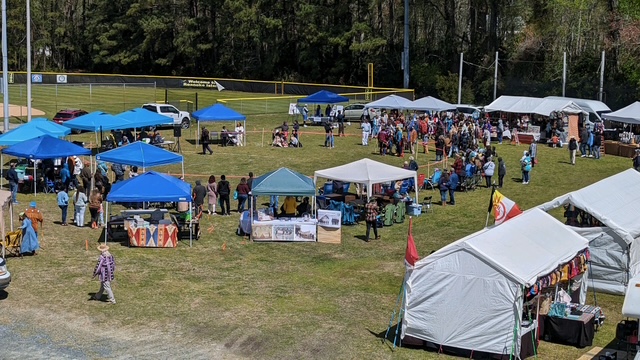
The Roanoke Island Powwow and Festival, now in its 14th year, brings recognition to the local tribes. Morrison and a few others see it as a way to proudly display their heritage and give others permission to do the same. Every year powwow visitors come forward with a story in their family about American Indian heritage. With her deep knowledge, Morrison can help separate fact from fiction and steer others to do their own genealogical research.
“If you know your family surnames, we can help you fill out your chart,” Morrison says. “If you think you have family history, we can teach you how to research it.”
Morrison says it is very difficult to research American Indian genealogy, which is a reason that many American Indians do not even know their heritage. For one thing, census records coded American Indians in confusing ways, either M or mulatto, R for redman or sometimes I for Indian. Often American Indians were coded B for black.
“That’s how we were killed on paper for more than 100 years,” Morrison says. “It takes a whole lot of effort to prove your lineage. American Indian is the only race of people who have to prove who they say they are.”
In her case, she is 100% certain who she is. “It is tight and I know it’s right,” she says.
People who can prove their family lineage can file paperwork and become an official tribal member.
Meanwhile, Morrison and others in her tribe are studying their native language in an Algonquian language reclamation class through Stony Brook University in New York. She also gives presentations about American Indian heritage and honest portrayals of the harsh truths of American Indian history.
At the Powwow and Festival in Manteo, Morrison encourages visitors to engage with tribe members.
“Start a conversation. Engage and ask questions, to learn,” she says.
Once visitors find out who the Roanoke-Hatteras Tribe is, Morrison encourages them to write to the N.C. Commission on Indian Affairs and ask them to recognize the tribe. "The Algonquian Nation deserves a seat on the N.C. Commission of Indian Affairs because we were the first people," Morrison says.
Some of the oldest living members of the Roanoke-Hatteras Tribe will be at the Roanoke Island Powwow and Festival. This may include Cora Elizabeth Berry Thompson, who was born on Roanoke Island and is the daughter of Maxie McKinley Berry, the last keeper of Pea Island Life-Saving Station when it was decommissioned in 1947.
Interestingly, the Pea Island Life-Saving Station, later a U.S. Coast Guard Station, is one of the best local reminders of local American Indian lineage. Numerous surfmen who worked at the station from 1880 to 1947 had known American Indian ties, including Morrison’s great-grandfather, Joseph Hall Berry, and other family members. Morrison says the Berry family alone has a combined 425 years of service in Life-Saving Service and Coast Guard on the Outer Banks and was recognized by the Coast Guard 5th District for its dedication. Many other families of American Indian descent served as well.
The Pea Island Life-Saving Station is often referred to as the only all-Black crew in U.S. Life-Saving history, but Morrison says this is erroneous. In a letter to Eleanor Roosevelt, Joseph Hall Berry wrote of his crew as being all-colored, a term Morrison says is more appropriate due to the American Indian heritage among the Black crew.
To learn more about this history, be sure to visit the Pea Island Preservation Society, Inc. (PIPSI) tent at the Powwow and Festival. On Saturday the names of surfmen with American Indian ties will be shared. These names can also be seen on a plaque that hangs on the outside wall of the Pea Island Cookhouse Museum on Roanoke Island.
Also at the Powwow and Festival, the Roanoke-Hatteras Tribe will proudly showcase a commemorative flag in honor of Israel Pierce, presented by the local Daughters of the American Revolution (DAR) chapter. The DAR helped prove that Pierce, who was of American Indian descent, was a Patriot who fought in the Revolutionary War. Based on the 1790 census, Pierce was a free person of color who considered himself a Pungo River Indian. The DAR helped Morrison go back 11 generations to prove an ancestral connection to Pierce.
These are just some of the things you can except to learn about at the Roanoke Island American Indian Powwow and Festival. There will also be food, music, dancing, vendors and fun. See below for more information.
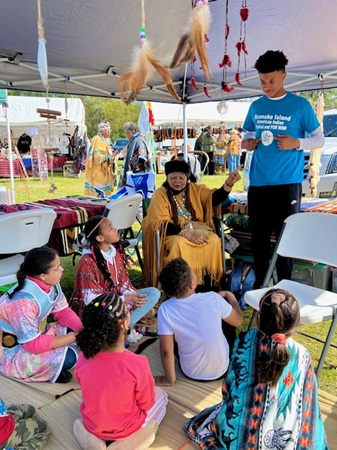
Want to go?
14th Roanoke Island American Indian Powwow and Festival
April 26 and 27, 11 a.m. to 4 p.m. each day
Manteo High School Athletic Practice Field, 829 Wingina Avenue, Manteo
Sponsored by the Algonquian Indians of North Carolina, Inc., and the Roanoke-Hatteras Indians of Dare County
Powwows are wonderful family events not only to enjoy but to learn. The event is also an important reminder that many who live in the area, past and present, are those with American Indian ties. “People need to know our true history,” Morrison says.
This event includes food, exhibits, music, dancing, health screenings, survival techniques and vendors. Those planning to attend are requested to bring a lawn chair, blanket or umbrella as no seating or shelter will be provided. Only service animals are allowed.
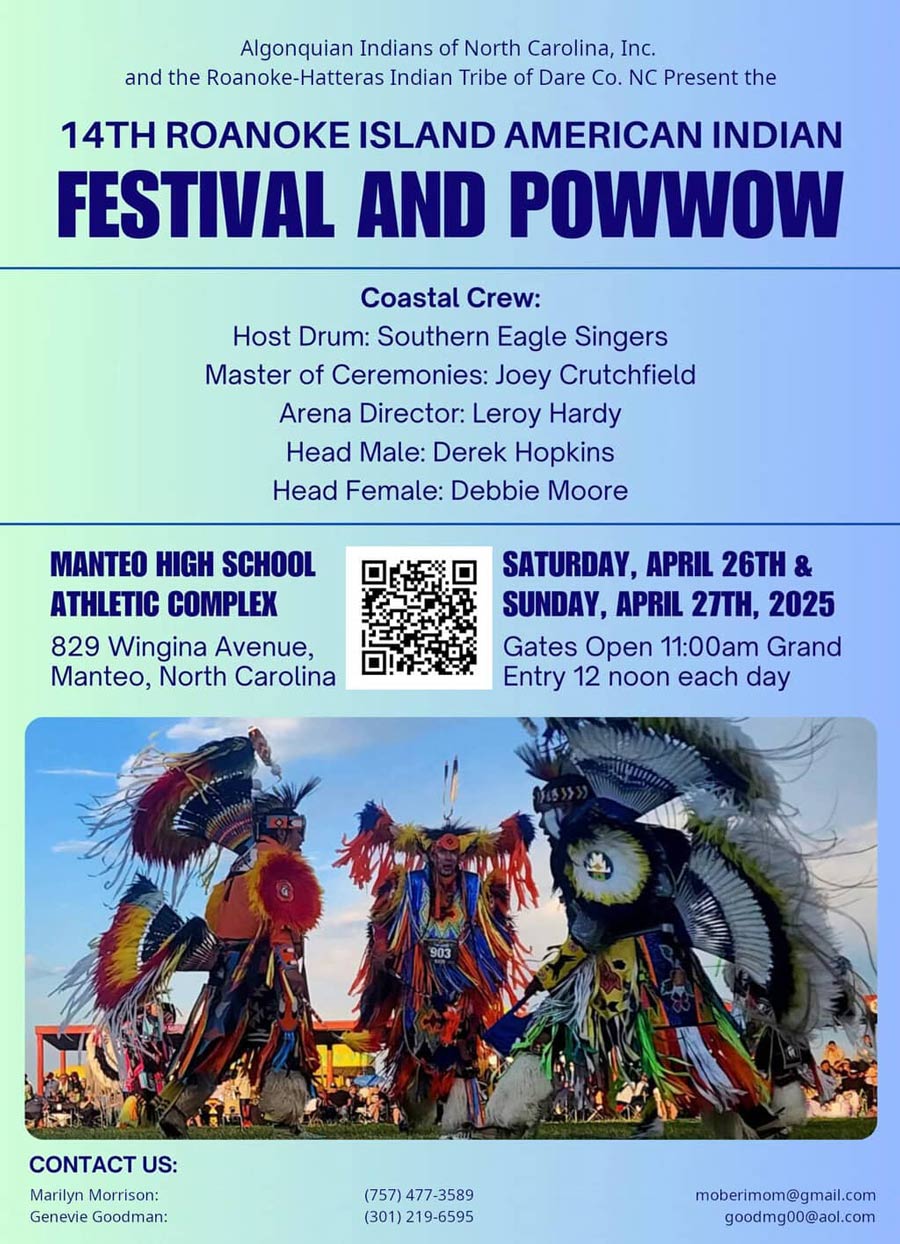

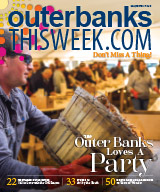
 Molly Harrison is managing editor at OneBoat, publisher of OuterBanksThisWeek.com. She moved to Nags Head in 1994 and since then has made her living writing articles and creating publications about the people, places and culture of the Outer Banks.
Molly Harrison is managing editor at OneBoat, publisher of OuterBanksThisWeek.com. She moved to Nags Head in 1994 and since then has made her living writing articles and creating publications about the people, places and culture of the Outer Banks.